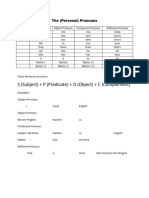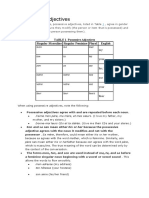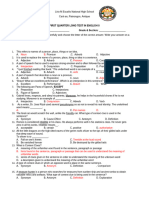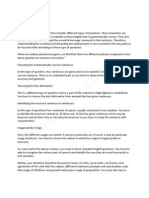Adjectifs Poss
Adjectifs Poss
Uploaded by
françoise arzulCopyright:
Available Formats
Adjectifs Poss
Adjectifs Poss
Uploaded by
françoise arzulOriginal Title
Copyright
Available Formats
Share this document
Did you find this document useful?
Is this content inappropriate?
Copyright:
Available Formats
Adjectifs Poss
Adjectifs Poss
Uploaded by
françoise arzulCopyright:
Available Formats
Possessive Adjectives / Adjectifs possessifs
How to say MY YOUR HIS / HER OUR YOUR THEIR in French?
mon, ma, mes ton, ta, tes son, sa, ses notre, nos votre, vos leur, leurs
A possessive adjective defines ownership of « something» and is placed before it in the sentence as a “determinant”.
There are four different cases we can think about: Follow the arrows
one "thing" The owner is I YOU HE/SHE
belongs to one (1st pers.sing) (2d pers. Sing) (3d pers sing) example :
person. The "thing" is MY YOUR HIS/HER
****
c'est mon livre
Masculin sing. MON TON SON c'est ton livre
c'est son livre
c'est ma robe
Singular Feminin sing. MA TA SA c'est ta robe
c'est sa robe
Feminin but the c'est mon amie
word starts MON TON SON c'est ton amie
with a vowel c'est son amie
*** In this case it is the gender of the belonging that determines the choice of adjective, not the gender of the owner like it
would in English. Ex: Whether a book belongs to a boy or a girl, HIS book or HER book will be translated by “SON” livre in both
cases because livre is masculine.
many "things" The owner is I YOU HE/SHE
belong to one The "things" are (1st pers.sing.) (2d pers. sing.) (3d pers sing.) examples :
person. MY YOUR HIS/HER
****
Ce sont mes livres.
Masc. Ce sont tes livres.
Ce sont ses livres.
Plural or MES TES SES
Ce sont mes robes.
Fem. Ce sont tes robes.
Ce sont ses robes.
one "thing" owners are WE YOU THEY
belongs to many (1st pers.plur.) (2d pers.plur.) (3 pers. Plur.) example :
people. The "thing" is OUR YOUR THEIR
c'est notre livre
Masc c'est votre livre
c'est leur livre
Singular or NOTRE VOTRE LEUR
c'est notre robe
Fem c'est votre robe
c'est leur robe
many "things" owners are WE YOU THEY
belong to many The "things" are (1st pers.plur.) (2d pers.plur.) (3 pers. Plur.) examples :
people. OUR YOUR THEIR
Ce sont nos livres.
Masc. Ce sont vos livres.
Ce sont leurs livres.
plural or NOS VOS LEURS
Ce sont nos robes.
Fem. Ce sont vos robes.
Ce sont leurs robes.
You might also like
- Basic Latin ChartsDocument13 pagesBasic Latin ChartsValentina Пембе Gjorgjievska100% (1)
- CAE Key Word TransformationsDocument7 pagesCAE Key Word TransformationsAnonymous m3yrUP100% (1)
- Changing Times Changing TensesDocument83 pagesChanging Times Changing TensesCheetah Ngo50% (2)
- 1 Theory - Using The Pronouns - Possessives, Object and ReflexiveDocument2 pages1 Theory - Using The Pronouns - Possessives, Object and ReflexiveJazmin RuizNo ratings yet
- Personal Pronouns Possessive Determiners Possessive Pronouns As Subject (Nominative) As Object (Accusative and Dative)Document4 pagesPersonal Pronouns Possessive Determiners Possessive Pronouns As Subject (Nominative) As Object (Accusative and Dative)Miriam Bastos MarzalNo ratings yet
- Lesson 1.2 Possessives: Possessives Are Classified Into Two Types According To Their Function in The SentenceDocument3 pagesLesson 1.2 Possessives: Possessives Are Classified Into Two Types According To Their Function in The SentenceMistral HarrisonNo ratings yet
- Personal PronounsDocument1 pagePersonal PronounsCarlaNo ratings yet
- Possessives - Adjectives and Pronouns WorksheetDocument1 pagePossessives - Adjectives and Pronouns WorksheetRaj YashNo ratings yet
- Possessive Adjectives VS Genitive CaseDocument5 pagesPossessive Adjectives VS Genitive CaseEdwin Guillermo Ramirez PenagosNo ratings yet
- Personal Pronouns Possessive Determiners Possessive Pronouns As Object (Accusative and Dative) As An Adjective As A NounDocument1 pagePersonal Pronouns Possessive Determiners Possessive Pronouns As Object (Accusative and Dative) As An Adjective As A NounRoxana GeanăNo ratings yet
- Possessive (Adjective + Noun) : AdjectivesDocument2 pagesPossessive (Adjective + Noun) : AdjectivesMustafa FahamNo ratings yet
- Curso de InglesDocument47 pagesCurso de InglesFernando CuestasNo ratings yet
- Exercise1 Possessive AdjectivesDocument2 pagesExercise1 Possessive AdjectivesErika Paola PradaNo ratings yet
- Ingles 3 2Document2 pagesIngles 3 2Jhoan Alexander Vasquez SanchezNo ratings yet
- This Is Coat.: Subject Pronoun I You He She It We You TheyDocument2 pagesThis Is Coat.: Subject Pronoun I You He She It We You TheyJhoan Alexander Vasquez SanchezNo ratings yet
- Ingles 4Document2 pagesIngles 4Jhoan Alexander Vasquez SanchezNo ratings yet
- Eslprintables 2011102955602376Document1 pageEslprintables 2011102955602376madalinaa20063737No ratings yet
- Contoh Possessive AdjectiveDocument6 pagesContoh Possessive AdjectiveCHukup Ndra KaDhuoNo ratings yet
- TabelDocument1 pageTabelIuliaNo ratings yet
- What Are Possessive AdjectivesDocument2 pagesWhat Are Possessive AdjectivesMauricio Osorio BecerraNo ratings yet
- English Subject Topic: PossessiveDocument6 pagesEnglish Subject Topic: PossessiveBeben BenNo ratings yet
- Personal Pronouns Possessive Determiners Possessive PronounsDocument2 pagesPersonal Pronouns Possessive Determiners Possessive PronounsMei YehNo ratings yet
- ACTIVITY 4 I 1.Document4 pagesACTIVITY 4 I 1.Jonathan Zarate TrejosNo ratings yet
- Adjectivul Si Pronumele PosesivDocument3 pagesAdjectivul Si Pronumele PosesivCristinutza CristinaNo ratings yet
- Possessive Adjectives: Personal Pronouns Possessive AdjectiveDocument2 pagesPossessive Adjectives: Personal Pronouns Possessive AdjectiveHans MendozaNo ratings yet
- Materi PronounDocument1 pageMateri PronounAnggi AnggraeniNo ratings yet
- 02 Unidad Concepto IIIDocument1 page02 Unidad Concepto IIIMayerly CalizayaNo ratings yet
- Colegio General Gustavo Rojas Pinilla Ied: Possessive AdjectivesDocument3 pagesColegio General Gustavo Rojas Pinilla Ied: Possessive AdjectivesreyNo ratings yet
- Class 4Document2 pagesClass 4sampurnwchakmaNo ratings yet
- Clase de InglésDocument17 pagesClase de Inglésyamirena chvaezNo ratings yet
- I 例 I am Saki. You He She: 例 The blue car is hersDocument1 pageI 例 I am Saki. You He She: 例 The blue car is hersDavid OnuohaNo ratings yet
- 8C Grammar Bank YMDocument2 pages8C Grammar Bank YMКароліна СеменкоNo ratings yet
- Possessive Adjectives: TABLE 1 Possessive Adjectives Singular Masculine Singular Feminine Plural EnglishDocument2 pagesPossessive Adjectives: TABLE 1 Possessive Adjectives Singular Masculine Singular Feminine Plural Englishzadkine2No ratings yet
- The Not Too Overly Possessive Russian PronounsDocument1 pageThe Not Too Overly Possessive Russian Pronounsandr7iNo ratings yet
- Unit 61Document6 pagesUnit 61Yoon's EnglishNo ratings yet
- B1.1 - Lesson 3Document1 pageB1.1 - Lesson 3Laura SmachettiNo ratings yet
- Engleski PravilaDocument2 pagesEngleski Pravilaiffi89No ratings yet
- 8C Grammar BankDocument2 pages8C Grammar BankRovshen BayramovNo ratings yet
- 02.2 Parts of Speech - Types of PronounsDocument2 pages02.2 Parts of Speech - Types of PronounsGadielNo ratings yet
- Countable and Uncountable NounsDocument6 pagesCountable and Uncountable NounsOrellana Mary BonillaNo ratings yet
- Contoh Kalimat Possessive Pronoun Vs AdjectiveDocument1 pageContoh Kalimat Possessive Pronoun Vs AdjectivemaiyaNo ratings yet
- Possessives: Girls Is Plural and Ends in "S" So:'Document1 pagePossessives: Girls Is Plural and Ends in "S" So:'Endahdwirahmawatie Mcih Celalu JutekNo ratings yet
- Object Pronouns: Subject Pronoun Object PronounDocument2 pagesObject Pronouns: Subject Pronoun Object PronounDaniel VelasquezNo ratings yet
- Personal, Possessive Pronouns and Verb To BeDocument9 pagesPersonal, Possessive Pronouns and Verb To BeMarmun Chivanguire ChivanguireNo ratings yet
- Personal PronounsDocument2 pagesPersonal PronounsingridtheoNo ratings yet
- Guia 8A - 2 - P1Document16 pagesGuia 8A - 2 - P1riverabejaranosamanthaNo ratings yet
- Anna Grammar Lesson 724Document4 pagesAnna Grammar Lesson 724ryanNo ratings yet
- Mi Libro My Book Mis Libros Tu Pluma Your Pen Tus Plumas Su Casa His/her House Sus CasasDocument2 pagesMi Libro My Book Mis Libros Tu Pluma Your Pen Tus Plumas Su Casa His/her House Sus Casasapi-398947709No ratings yet
- NOUNDocument2 pagesNOUNasif hussainNo ratings yet
- GrammarDocument13 pagesGrammarNguyênNo ratings yet
- DANRAM English Academy. Private Classes C.ADocument1 pageDANRAM English Academy. Private Classes C.AGuillermo StefanNo ratings yet
- Possessive Adjectives:: Personal Pronouns Possessive AdjectiveDocument2 pagesPossessive Adjectives:: Personal Pronouns Possessive AdjectivefdfefefNo ratings yet
- Tabla de Adjetivos Posesivos Con EjerciciosDocument1 pageTabla de Adjetivos Posesivos Con EjerciciosKaren CamargoNo ratings yet
- Pronoun (Kata Ganti Benda) : S + Tobe + Noun or S + Tobe + AdjectiveDocument3 pagesPronoun (Kata Ganti Benda) : S + Tobe + Noun or S + Tobe + AdjectiveDidik LeoNo ratings yet
- NOTE Pronouns 代词Document1 pageNOTE Pronouns 代词low manmanNo ratings yet
- Pronombre PosesivoDocument9 pagesPronombre PosesivoLesslie ChávezNo ratings yet
- Pronouns Grammar Guides - 47674Document1 pagePronouns Grammar Guides - 47674susanapintoNo ratings yet
- Adjetivos PosesivosDocument4 pagesAdjetivos PosesivosGutiérrez Fuentes GabrielNo ratings yet
- SpanishDocument17 pagesSpanishrodriguezlaiza81No ratings yet
- Adjectives - Possesive PronuonsDocument6 pagesAdjectives - Possesive Pronuonsbielsagamer3112No ratings yet
- PossessiveDocument4 pagesPossessivePedro HenriquesNo ratings yet
- Possessive AdjectivesDocument3 pagesPossessive AdjectivesDiana VillagraNo ratings yet
- Summative Test English 8 - Q1Document5 pagesSummative Test English 8 - Q1Nelissa Pearl ColomaNo ratings yet
- Soal TOEFL (Structure Test 3) : (C) Sent Flowers Faithfully To The Cemetery Each WeekDocument9 pagesSoal TOEFL (Structure Test 3) : (C) Sent Flowers Faithfully To The Cemetery Each WeekKein LanaNo ratings yet
- Ranko Matasovic - A Grammatical Sketch of Classical Armenian-University of Zagreb (2009)Document38 pagesRanko Matasovic - A Grammatical Sketch of Classical Armenian-University of Zagreb (2009)Peppino012No ratings yet
- Reporting Verbs - Admit Doing, Refuse To Do, Etc. - Page 2 of 3 - Test-EnglishDocument6 pagesReporting Verbs - Admit Doing, Refuse To Do, Etc. - Page 2 of 3 - Test-EnglishcontactoanasouzaNo ratings yet
- Technical English WritingDocument30 pagesTechnical English Writingsaqlainhaider24816No ratings yet
- 1 Saying Hello: PDF Processed With Cutepdf Evaluation EditionDocument13 pages1 Saying Hello: PDF Processed With Cutepdf Evaluation EditionBenom BeniNo ratings yet
- RM A2 PC Notes AKDocument23 pagesRM A2 PC Notes AKლია გორგაძეNo ratings yet
- CH 1 Unit 3 My Friends and IDocument24 pagesCH 1 Unit 3 My Friends and IHendri Mardian AdriansyahNo ratings yet
- Libro de Ingles BritanicoDocument4 pagesLibro de Ingles BritanicoYuracraft GamerNo ratings yet
- t2 e 3953 Year 4 Using Pronouns and Other Nouns To Avoid Repetition Warm Up Powerpoint - Ver - 5Document15 pagest2 e 3953 Year 4 Using Pronouns and Other Nouns To Avoid Repetition Warm Up Powerpoint - Ver - 5ブロン アマンNo ratings yet
- Test Initial A XI EnglezaDocument3 pagesTest Initial A XI EnglezaVictoriaVacarițaNo ratings yet
- EMPHATIC STRUCTURES (With Practice and Key)Document7 pagesEMPHATIC STRUCTURES (With Practice and Key)AliciaM7No ratings yet
- Preposition Class 7Document6 pagesPreposition Class 7ishaagarwal400No ratings yet
- LifeGramResources 01 L3 PDFDocument2 pagesLifeGramResources 01 L3 PDFgilmourishNo ratings yet
- Basic Structure of English Grammar Lessons ObjectivesDocument63 pagesBasic Structure of English Grammar Lessons ObjectivesEresh GomezNo ratings yet
- 2 Presentation (Syntax)Document13 pages2 Presentation (Syntax)Şeyma İrem CandanNo ratings yet
- Offering Help - Rini Khairunnisa UsmanDocument16 pagesOffering Help - Rini Khairunnisa UsmanNanda RestuNo ratings yet
- Aula 3 - English (Curso Básico - Teacher Claudia EleutérioDocument22 pagesAula 3 - English (Curso Básico - Teacher Claudia EleutérioMarcelo Bernardino AraújoNo ratings yet
- ConditionalsDocument3 pagesConditionalsAnonymous FB39PeEgyNo ratings yet
- Error CorrectionDocument14 pagesError CorrectionRavi Kr YadavNo ratings yet
- Parts of Speech (Pos) PracticesDocument3 pagesParts of Speech (Pos) PracticesDavid WilliamNo ratings yet
- Buku TOEFL Deborah PhillipsDocument5 pagesBuku TOEFL Deborah Phillips13218056 Muhammad Tegar AzkiyaNo ratings yet
- Annabel LeeDocument12 pagesAnnabel LeecarmelaercillaNo ratings yet
- Unit 1 Using A DictionaryDocument7 pagesUnit 1 Using A Dictionarysad nanNo ratings yet
- Using Adjectives PowerpointDocument11 pagesUsing Adjectives PowerpointAhmed KaramNo ratings yet
- Sentence Correction Quiz 18Document9 pagesSentence Correction Quiz 18Ranaweera Arachchi JayaNo ratings yet
- Proofreading Answers Sydney Ferries 1Document1 pageProofreading Answers Sydney Ferries 1Amanda RuthNo ratings yet
























































































